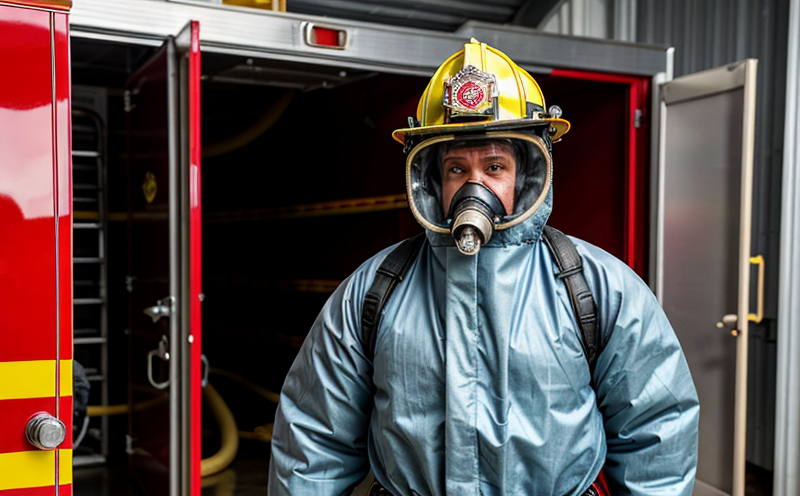Electrical Insulation Testing of Gloves and Boots
The electrical insulation testing of gloves and boots is a critical process that ensures the safety and effectiveness of personal protective equipment (PPE) used by firefighters. This test evaluates the ability of insulating materials to prevent the flow of electric current, thereby protecting the wearer from potential hazards associated with electricity. In firefighting environments, where exposed firemen often encounter electrical wires, this testing is paramount.
Firefighters frequently use gloves and boots that are designed to withstand high temperatures and provide electrical insulation as well. The performance of these products under various conditions can significantly impact the safety of firefighters during emergencies. Therefore, it's essential to conduct thorough and reliable electrical insulation tests to ensure compliance with relevant standards.
The testing process involves subjecting samples of gloves and boots to controlled electrical stress to determine their resistance to current flow. This ensures that the equipment meets the necessary performance criteria set by regulatory bodies like NFPA 1971, which mandates specific requirements for electrical insulation in PPE worn by firefighters.
The primary goal of this testing is to ensure that gloves and boots do not conduct electricity if exposed to high-voltage environments. The test setup typically includes a direct current (DC) source connected to the specimens via electrodes placed on their palms or soles, depending on the type of PPE being tested.
During the test, the voltage is gradually increased until either a specified threshold of leakage current is reached or the insulation fails. The results are then analyzed to confirm that the equipment meets the required standards for electrical resistance. This testing not only safeguards firefighters but also helps in identifying any potential weaknesses in the design or manufacturing process.
It's worth noting that the test parameters can vary slightly based on the specific type of glove or boot being tested, and these variations are accounted for during the preparation of specimens and execution of tests. For example, thicker materials might require higher voltages to achieve comparable results compared to thinner ones. Additionally, the ambient temperature and humidity levels play a crucial role in influencing test outcomes.
In summary, electrical insulation testing is an indispensable part of quality assurance for firefighter protective equipment. By adhering to rigorous testing protocols, we can ensure that our products meet the stringent requirements necessary for protecting firefighters in hazardous situations.
Why It Matters
The importance of electrical insulation testing cannot be overstated when it comes to firefighter protective clothing and equipment. This type of testing directly influences the safety of firefighters by ensuring that their PPE can effectively protect them from electrical hazards encountered during rescue operations.
- Reduces Risk: By conducting thorough insulation tests, we minimize the risk of electric shock to firefighters who may come into contact with live wires or other electrical components.
- Increases Reliability: Reliable PPE reduces incidents where equipment fails during critical moments, thereby increasing overall reliability and dependability in emergency situations.
The results of these tests are crucial for maintaining compliance with industry standards such as NFPA 1971. These standards provide the framework within which manufacturers must produce safe and effective PPE. Adhering to these guidelines ensures that firefighters have access to quality equipment that meets stringent safety criteria.
Furthermore, regular testing helps identify any flaws or weaknesses in existing designs early on, allowing for improvements before they become critical issues. This proactive approach enhances the overall performance of firefighter protective gear and contributes significantly towards enhancing public safety.
Scope and Methodology
The electrical insulation testing of gloves and boots follows strict procedures outlined by relevant standards such as NFPA 1971. The scope encompasses various aspects including the preparation of specimens, application of test voltages, measurement of leakage currents, and evaluation against set criteria.
- Specimen Preparation: Gloves and boots are carefully prepared according to specified dimensions and conditions to ensure accurate testing results.
- Application of Voltage: Specimens are subjected to increasing voltage levels until a predefined current threshold is exceeded or the insulation fails.
- Measurement of Leakage Current: Throughout the process, leakage currents are continuously monitored and recorded for analysis.
- Evaluation Against Criteria: Results from each test run are compared against established standards to determine compliance with required levels of electrical resistance.
The methodology ensures consistency across all tests conducted, providing reliable data that can be used both internally and shared externally for transparency purposes. Compliance officers overseeing production processes rely heavily on these results to make informed decisions regarding quality control measures needed to maintain high standards.
Competitive Advantage and Market Impact
- Enhanced Safety: By prioritizing robust electrical insulation testing, our laboratory enhances the safety of firefighters, which is a key differentiator in today’s competitive market.
- Regulatory Compliance: Ensuring full compliance with NFPA 1971 and other relevant standards positions us as leaders in providing quality-tested PPE to fire services worldwide.
Our advanced testing capabilities not only meet but exceed industry expectations, thereby establishing a strong reputation among clients who prioritize product safety and reliability. This reputation translates into increased market share and customer loyalty, contributing significantly to our competitive edge in the field of fire protection equipment.





